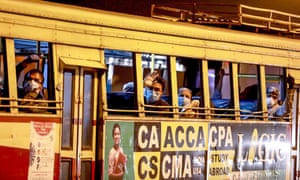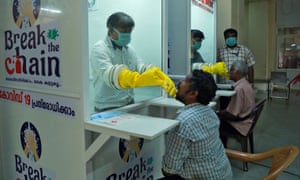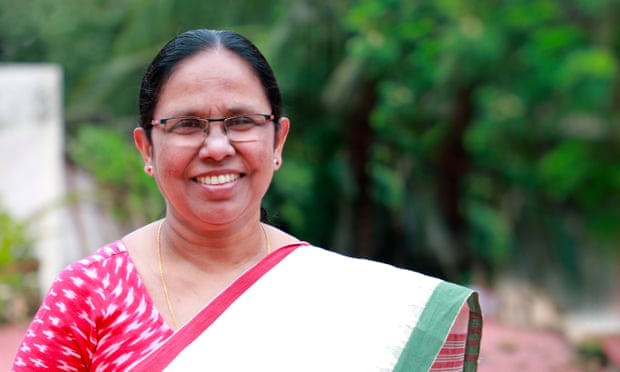On 20 January, KK Shailaja phoned one of her medically trained deputies. She had read online about a dangerous new virus spreading in China. “Will it come to us?” she asked. “Definitely, Madam,” he replied. And so the health minister of the Indian state of Kerala began her preparations.Four months later, Kerala has reported only 524 cases of Covid-19, four deaths and – according to Shailaja – no community transmission. The state has a population of about 35 million and a GDP per capita of only £2,200. By contrast, the UK (double the population, GDP per capita of £40,400) has reported more than 40,000 deaths, while the US (10 times the population, GDP per capita of £51,000) has reported more than 82,000 deaths; both countries have rampant community transmission.
As such, Shailaja Teacher, as the 63-year-old minister is affectionately known, has attracted some new nicknames in recent weeks – Coronavirus Slayer and Rockstar Health Minister among them. The names sit oddly with the merry, bespectacled former secondary school science teacher, but they reflect the widespread admiration she has drawn for demonstrating that effective disease containment is possible not only in a democracy, but in a poor one.
As the passengers filed off the Chinese flight, they had their temperatures checked. Three who were found to be running a fever were isolated in a nearby hospital. The remaining passengers were placed in home quarantine – sent there with information pamphlets about Covid-19 that had already been printed in the local language, Malayalam. The hospitalised patients tested positive for Covid-19, but the disease had been contained. “The first part was a victory,” says Shailaja. “But the virus continued to spread beyond China and soon it was everywhere.”
In late February, encountering one of Shailaja’s surveillance teams at the airport, a Malayali family returning from Venice was evasive about its travel history and went home without submitting to the now-standard controls. By the time medical personnel detected a case of Covid-19 and traced it back to them, their contacts were in the hundreds. Contact tracers tracked them all down, with the help of advertisements and social media, and they were placed in quarantine. Six developed Covid-19.

At the height of the virus in Kerala, 170,000 people were quarantined and placed under strict surveillance by visiting health workers, with those who lacked an inside bathroom housed in improvised isolation units at the state government’s expense. That number has shrunk to 21,000. “We have also been accommodating and feeding 150,000 migrant workers from neighbouring states who were trapped here by the lockdown,” she says. “We fed them properly – three meals a day for six weeks.” Those workers are now being sent home on charter trains.
The villagers were terrified and ready to flee, because they did not understand how the disease was spreading. “I rushed there with my doctors, we organised a meeting in the panchayat [village council] office and I explained that there was no need to leave, because the virus could only spread through direct contact,” she says. “If you kept at least a metre from a coughing person, it couldn’t travel. When we explained that, they became calm – and stayed.”
Nipah prepared Shailaja for Covid-19, she says, because it taught her that a highly contagious disease for which there is no treatment or vaccine should be taken seriously. In a way, though, she had been preparing for both outbreaks all her life.
The Communist Party of India (Marxist), of which she is a member, has been prominent in Kerala’s governments since 1957, the year after her birth. (It was part of the Communist Party of India until 1964, when it broke away.) Born into a family of activists and freedom fighters – her grandmother campaigned against untouchability – she watched the so-called “Kerala model” be assembled from the ground up; when we speak, this is what she wants to talk about.
This is true of other states, too, says MP Cariappa, a public health expert based in Pune, Maharashtra state, but nowhere else are people so invested in their primary health system. Kerala enjoys the highest life expectancy and the lowest infant mortality of any state in India; it is also the most literate state. “With widespread access to education, there is a definite understanding of health being important to the wellbeing of people,” says Cariappa.
Shailaja says: “I heard about those struggles – the agricultural movement and the freedom fight – from my grandma. She was a very good storyteller.” Although emergency measures such as the lockdown are the preserve of the national government, each Indian state sets its own health policy. If the Kerala model had not been in place, she insists, her government’s response to Covid-19 would not have been possible.

That said, the state’s primary health centres had started to show signs of age. When Shailaja’s party came to power in 2016, it undertook a modernisation programme. One pre-pandemic innovation was to create clinics and a registry for respiratory disease – a big problem in India. “That meant we could spot conversion to Covid-19 and look out for community transmission,” Shailaja says. “It helped us very much.”
When the outbreak started, each district was asked to dedicate two hospitals to Covid-19, while each medical college set aside 500 beds. Separate entrances and exits were designated. Diagnostic tests were in short supply, especially after the disease reached wealthier western countries, so they were reserved for patients with symptoms and their close contacts, as well as for random sampling of asymptomatic people and those in the most exposed groups: health workers, police and volunteers.
Places of worship were closed under the rules of lockdown, resulting in protests in some Indian states, but resistance has been noticeably absent in Kerala – in part, perhaps, because its chief minister, Pinarayi Vijayan, consulted with local faith leaders about the closures. Shailaja says Kerala’s high literacy level is another factor: “People understand why they must stay at home. You can explain it to them.”
Once the second wave has passed – if, indeed, there is a second wave – these teachers will return to schools. She hopes to do the same, eventually, because her ministerial term will finish with the state elections a year from now. Since she does not think the threat of Covid-19 will subside any time soon, what secret would she like to pass on to her successor? She laughs her infectious laugh, because the secret is no secret: “Proper planning.”

